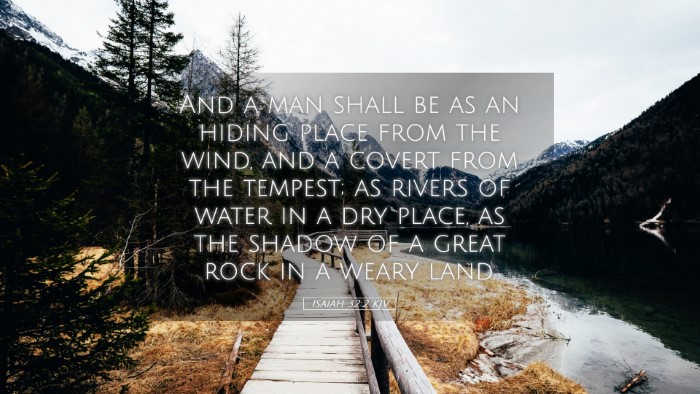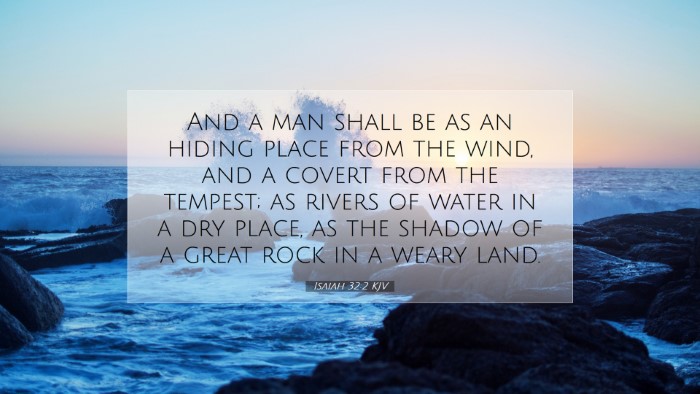Commentary on Isaiah 32:2
Verse: Isaiah 32:2
"And a man shall be as an hiding place from the wind, and a covert from the tempest; as rivers of water in a dry place, as the shadow of a great rock in a weary land."
Introduction
The verse under consideration captures a profound promise of protection and provision. This commentary combines insights from esteemed public domain theologians—Matthew Henry, Albert Barnes, and Adam Clarke—offering a multifaceted understanding suitable for pastors, students, theologians, and Bible scholars.
Contextual Background
The book of Isaiah is rich in prophecies and promises that convey God's ultimate intention to redeem His people. Chapter 32 addresses a transition from judgment to restoration, anticipating the coming of a righteous king. The imagery presented in this verse is vital for understanding God’s protective nature and the role of righteous leaders.
Analysis of Key Phrases
"A man shall be as a hiding place"
Matthew Henry notes that the "man" refers to a leader, likely Messianic in nature, representing a refuge for those in need. In times of strife, the righteous leader provides safety and hope.
"From the wind and covert from the tempest"
Albert Barnes elaborates that the wind symbolizes adversity, while the tempest represents more severe trials. A righteous leader offers shelter against both natural and spiritual challenges, functioning as a safeguard against various forms of distress.
"As rivers of water in a dry place"
Adam Clarke emphasizes that water is essential for life, particularly in arid terrains. This metaphor illustrates how the presence of a righteous leader can refresh and sustain the weary, providing nurture in times of spiritual drought.
"As the shadow of a great rock in a weary land"
This imagery suggests a place of refuge and relief—a vital reminder that even in the most challenging circumstances, there exists a divine shelter. Matthew Henry reflects on the gospel message that offers shade and rest from the oppressive heat of sin and turmoil.
Theological Implications
The verse presents Christological implications, typifying Jesus as the ultimate refuge. Just as the leaders in Isaiah's time provided temporary reprieve, Jesus offers eternal security. The promise of protection extends beyond mere physical safety to encompass spiritual salvation through faith in Him.
Applications for Modern Believers
- Hope in Leadership: Pastors and spiritual leaders are reminded to serve as conduits of God's grace, providing shelter and sustenance for their congregations.
- Personal Refuge: Individuals can find solace in Christ as their hiding place, embracing the protection and love He offers in times of trouble.
- Community Support: The church is called to be a refuge for the weary and a place of restoration for those battered by life's storms.
Conclusion
Isaiah 32:2 paints an impactful picture of divine protection manifesting through leadership and the blessings of a relationship with God. The insights from Matthew Henry, Albert Barnes, and Adam Clarke remind us that amidst adversity, we have a shelter and provider in the Lord. This passage calls for reflection on the role we play in offering refuge to others and the assurance we can find in the promises of God.


